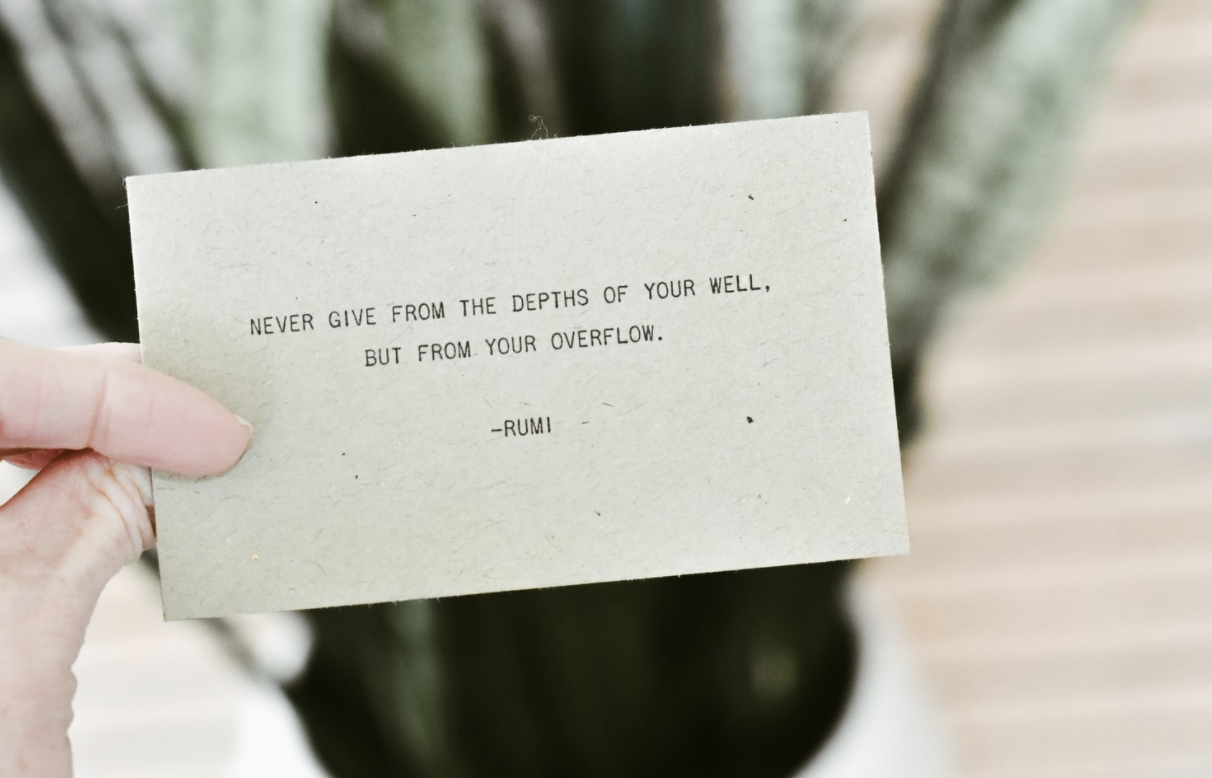“Your heart knows the way. Run in that direction.” - Rumi
I have always been drawn to Rumi. But when I discovered that he was the best selling poet in the United States (more popular than Shakespeare) I was even more intrigued. I pulled “The Essential Rumi” by Coleman Barks from my bookshelf, dusted it off and began reading.
I love that his writings are timeless, and that he can speak to anyone regardless of their faith. Despite time, geography and religion this poet speaks to what all humans yearn for: inner transformation, love and a connection to the sacred. His profound understanding of love is expressed so beautifully. “Your task is not to seek for love, but merely to seek and find all the barriers within yourself that you have built against it.” In addition to being profound, Rumi is also charming and witty. “Yesterday I was clever, and I wanted to change the world. Today I am wise and I want to change myself,“ was his opinion on transformation.
Rumi makes his way west
Although his writings are 800 years old it wasn’t until 1976 that his work got picked up in the west. The story, was that Robert Bly, an American poet, handed Coleman Barks an early translation of Rumi’s work. “These poems need to be released from their cages,” he said. It took about nine years for Barks to transform them. He had to “transform them from stiff academic language into American-style free verse,” he wrote. Barks released the “caged poems,” which turned Rumi into a common household name.
Who was Rumi?
Rumi was a 13th century Persian poet and a top Islamic scholar and theologian of his time. He was born in Afghanistan, but the rise of Genghis Khan made his family flee to Konya, Turkey, where they settled along the famous silk road. Interestingly, the silk road was a melting pot of various travelers—jews, christians, hindus, and buddhists. The exposure to this diversity impacted Rumi. Although partial to Islam, the tone of his poetry is accepting and tolerant of all religions. He was an esoteric man, that wanted to share his inner experience. ”I looked in temples, churches and mosques. But I found the divine within my own heart,” he said. Exposure to the silk road wasnʻt the only thing that affected him. What really released his genius was the pain he endured after the loss of his most beloved friend.
“The cure for the pain is in the pain.” Rumi had not arrived at his full potential until a painful tragedy took it’s toll. This is truly where the story becomes mystic. The one person he loved more than himself went missing—never to return. Shams of Tabriz was Rumi’s teacher and most beloved friend. Their friendship, which lasted three years, was mysterious, unique and special. One night Shams left and was never seen again. Some speculate that he was murdered by one of Rumi’s jealous followers. Rumi went searching, but never found him. He was deeply distraught and heart-broken over this separation, and as a result he began to whirl on his left foot while singing and speaking poetry. It was the tipping point that gave Rumi his immortal voice.
Mystical moments are not always as they seem
Often times there is a dreamy notion that what sparks the mystical is beautiful and sublime. But it can also be loss, challenge and tragedy that creates mysticism. Confronted with severe inner struggle it seems the human spirit either withers away or transforms, depending on the tools theyʻve been given. In this tale, Rumi is a mystic and built into him was the means to transform. I don’t think he realized then how much his “transformation through loss” would affect millions of people so far into the future.
The loss over Shams disappearance and the years of anguish Rumi spent searching for him, finally ended with a heart moving realization: “Why should I seek? I am the same as he. His essence speaks through me. I have been looking for myself!” What a profound knowingness, that what he had been seeking had been with him all along.
I read this passage to my 6 year old son. I am not sure he really got it, but I put myself in Rumi’s place—pondering how I would feel if my boy went missing and was never to be found. To read his words from that vantage point was very meaningful for me. The harsh reality is that impermanence is a given. We will eventually lose the ones we love, but we will never lose their essence.
This is just some of the potency of Rumi’s poetry. In times of difficulty he can be quite sobering. His agenda is to help broaden our perspectives about the mystery of the universe, the mystery of being human and how they relate to each other.
I love when he reveals his human side. “Sometimes I forget completely what companionship is. Unconscious and insane, I spill sad energy everywhere. Friends be careful. Don’t come near me out of curiosity or sympathy.”
And I appreciate his confident reminders. “You are more precious than both heaven and earth. You know not your own worth. Sell not yourself at little price, Being so precious in God’s eyes.”
One of my favorite versus speaks to the differences of opinions we all have, especially regarding politics or any other heated emotional topic. “Out beyond ideas of wrongdoing and rightdoing, there is a field. I’ll meet you there. When the soul lies down in that grass, the world is too full to talk about ideas, language, even the phrase each other—doesn’t make any sense.”
Today Rumi is a globally cherished poet and mystic. His tomb is a sacred shrine, that receives over two million visitors a year. His poetry helps us remember to connect, open up and soften.
Reflecting back on Robert Bly’s comment, “these poems must be released from their cages,” it feels like metaphorically this is what Rumi was doing for us. Through his poetic inspiration, he was helping to release the human spirit from our own “self-created cages,” so that we too may fly, soar, and experience the freedom that we were always meant to have.
A Yoga Unplugged collaboration - written by Jennifer Reuter, edited by Sarah Burchard
Photo by Allie Smith via Unsplash



